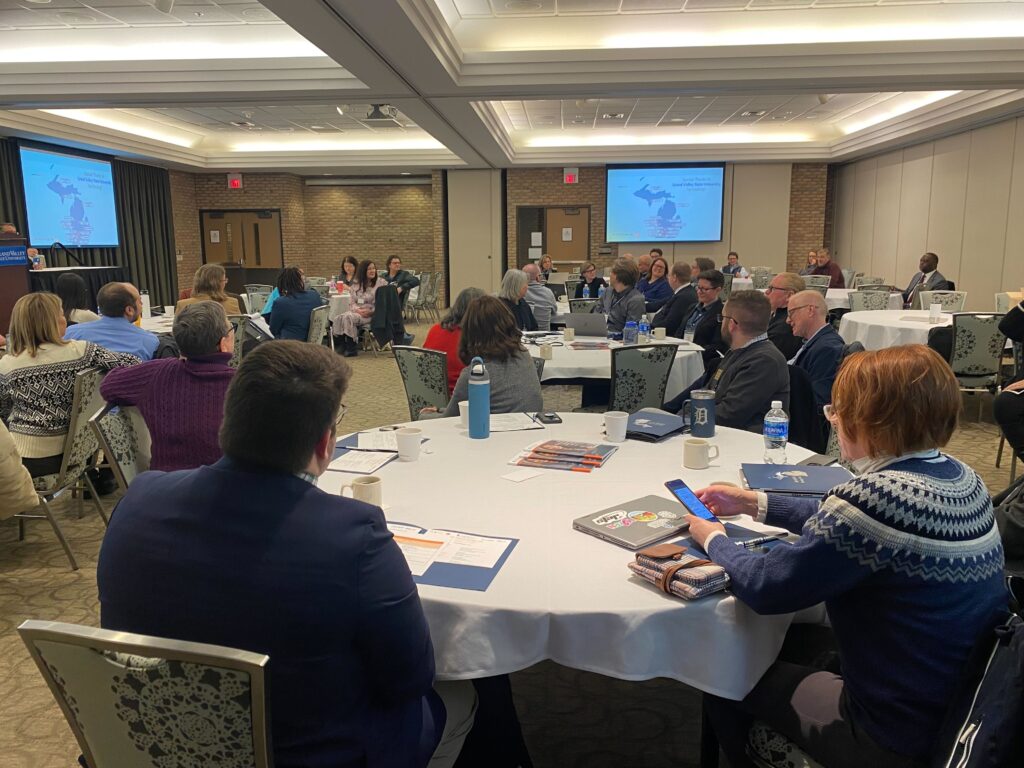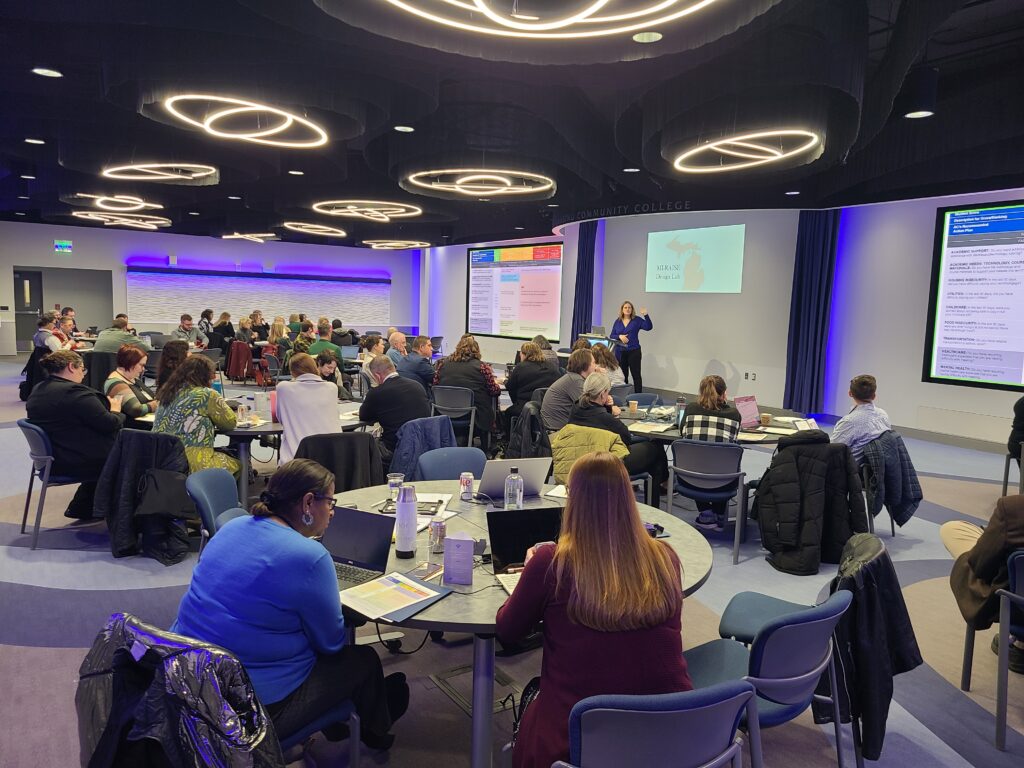Gov. Gretchen Whitmer’s 2024 State of the State address on Jan. 24 generated headlines about two topics that have long been priorities for TalentFirst: improving kindergarten readiness and postsecondary attainment.
More specifically, the governor’s address (PDF) included:
- A renewed call to provide free preschool for every 4-year-old in the state.
- A proposal to make community college free for every high school graduate.
Both have important objectives. Access to quality pre-K education is critical so children enter kindergarten ready to learn. And it’s imperative that Michigan improve its postsecondary attainment — a metric where we rank 37th nationally and last in the Midwest (PDF).
TalentFirst has long championed these causes. Along the way, we have seen some important wins. We applaud the attention the governor has placed on them.
Beyond the headlines, however, are some complicating factors that must be considered if we hope to truly make progress toward a flourishing Michigan that attracts employers, a state where communities and families can thrive.
TalentFirst has taken a leadership role on these topics for the better part of a decade, through research and by working alongside CEOs, educators, workforce leaders, nonprofits, policymakers and others. This experience has provided insights that should be considered alongside the governor’s proposals.
Universal Pre-K
“In our next budget, let’s deliver pre-K for every single 4-year-old in Michigan. … When we get this done, no matter who you are, where you come from, or how much you make, your child can enroll in pre-K and be set up for success.”
— Gov. Gretchen Whitmer, 2024 State of the State address
TalentFirst has a long track record of advocating for greater funding and expanded access to the Great Start Readiness Program — the state’s income-based preschool program for 4-year-olds who face risk of educational failure. We also helped to launch of PreK4All in Muskegon Public Schools and Muskegon Heights Public Schools.
Volumes of research clearly show that quality preschool education is critical to ensure students enter kindergarten ready to learn — and to equip them for lifelong success in learning and health. Children from poor families or who face other disadvantages often benefit the most (PDF) .
While researchers agree on the value of preschool, disagreement emerges when comparing approaches: targeted vs. universal.
The University of Michigan’s Education Policy Initiative’s policy brief, An Evidence-Based Path to Expanding High-Quality Pre-K in Michigan (PDF) , notes multiple adjustments that would be necessary to shift to universal access to GSRP, including:
- Providing pay equity with K-12 teachers.
- Improving ability to serve students with disabilities.
- Replacing the most common curricula with evidence-based programs.
- Expansion makes it more critical than ever to establish a statewide kindergarten assessment as part of a quality-based pre-K to early elementary continuum.
Another caution raised by the brief, and explored extensively by the Policy Equity Group , is the potential for universal pre-K to further decimate the supply of infant and toddler care.
Families in Michigan already struggle finding affordable, high-quality childcare because it is so difficult for providers to stay in business. Publicly funded universal pre-K could be another blow to that business model. Any further loss of providers would be harmful to children and families, while forcing more parents to unwillingly opt out of the workforce.
A more effective approach would be to expand the GSRP program to at-risk 3-year-olds – children who have the fewest opportunities and the largest barriers to a quality education.
Free Community College
“In our next budget, let’s make the first two years of community college in Michigan tuition-free for every high school graduate. … This is a transformational opportunity for graduating seniors and will help us achieve our Sixty by 30 goal to have 60% of adults earn a post-secondary degree or skills training by 2030.”
— Gov. Gretchen Whitmer, 2024 State of the State address
TalentFirst wholeheartedly agrees with the need to increase postsecondary attainment in Michigan. This is a vital part of our talent strategy in an increasingly knowledge-based economy where education and skills are the keys to good-paying jobs.
Last year TalentFirst launched The Michigan Center for Adult College Success to support the state’s Sixty by 30 goal. The Center is designed to complement state tuition supports such as Michigan Reconnect , which recently expanded tuition reimbursement to anyone 21 and older.
The governor’s proposal to expand eligibility to all high school graduates is intended to encourage greater enrollment. However, enrollment is only one of the obstacles Michigan faces in its pursuit of its postsecondary attainment goal. An even bigger problem is our poor completion rate.
Our research on this topic has revealed other factors that should be considered while examining the viability of universal free community college:
- Tuition reimbursement alone fails to cover the true cost for students. Books, housing, transportation and the tradeoff between earning money at a job or going to class are real considerations.
- What really drives completion rates: Working with postsecondary institutions to help address the barriers to completion. Proven academic and non-academic support systems have demonstrated significant increases.
Michigan would not be the first state to offer free community college, and the experiences elsewhere should be examined. While these programs may produce an initial increase in enrollment, they generally fail to leverage large increases in credential attainment.
Tennessee’s experience may be instructive. After launching Tennessee Promise in 2014, total enrollment increased but the percentage of community college students who returned for their second year declined (PDF) . By 2021, the state’s increase in postsecondary attainment was 8 percentage points, to 47.3% in 2021 — but gains had plateaued, growing only half a percentage point from 2019 to 2021. (For comparison, Michigan saw its rate grow 7.2 percentage points in the same time frame, to 50.5%, and also saw its growth slow from 2019-21.)
Moving Forward
State of the State addresses typically are followed by partisan praise and criticism. Whitmer’s address was no exception.
It’s important, however, to not get caught up in the headlines — or the noise. The challenges facing Michigan are too great.
Look no further for proof than the report earlier this week (PDF) by Michigan Future Inc. and researchers from the University of Michigan, which noted the state is now ranked 39th in personal income per capita.
Worse, this is a decline from 20 years ago, when the same researchers warned “that if Michigan did not become more concentrated in knowledge-based industries and retaining and growing our share of young professionals, Michigan would become a low-prosperity state.”
Neither Talent First, its member CEOs, nor our partners are willing to let that happen.
Michigan policymakers would be wise to choose practical and proven strategies to realize the educational outcomes and prosperity we want for our fellow citizens, communities and state and to avoid headline-grabbing proposals that aren’t likely to work.


